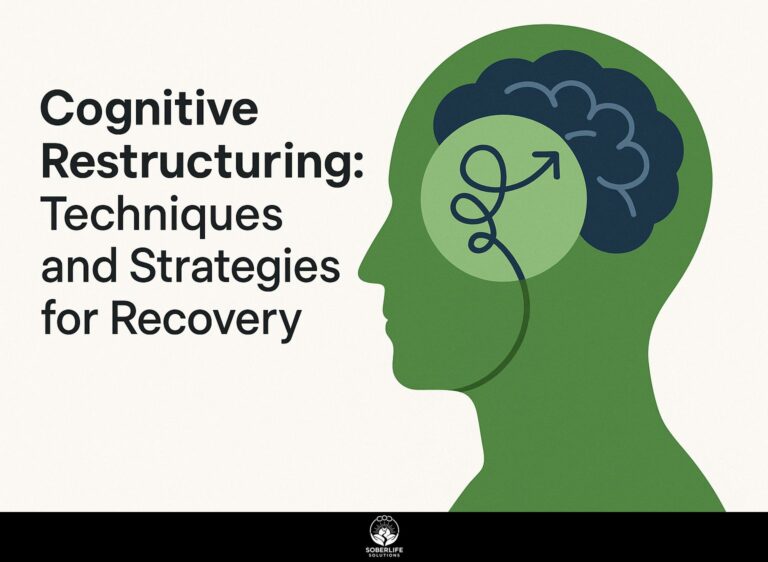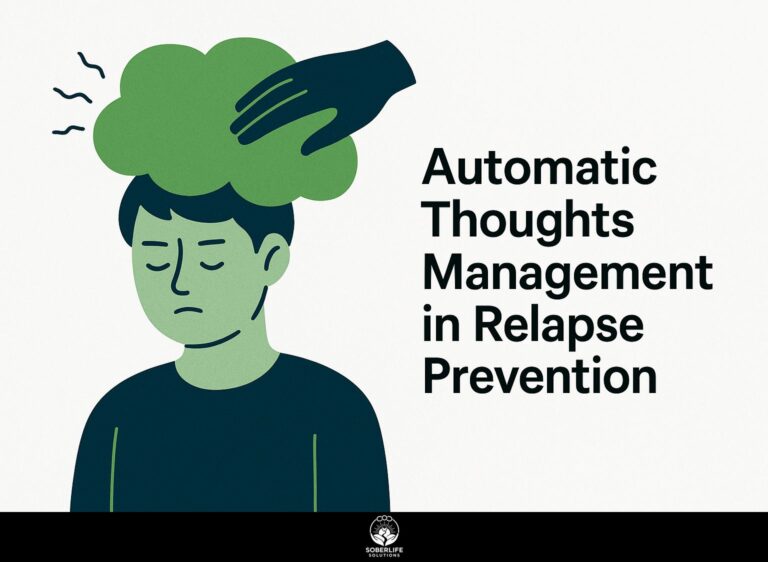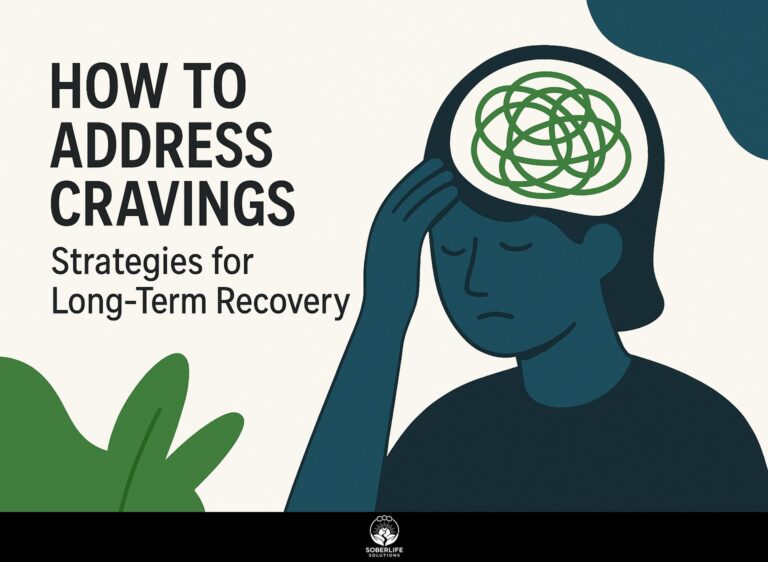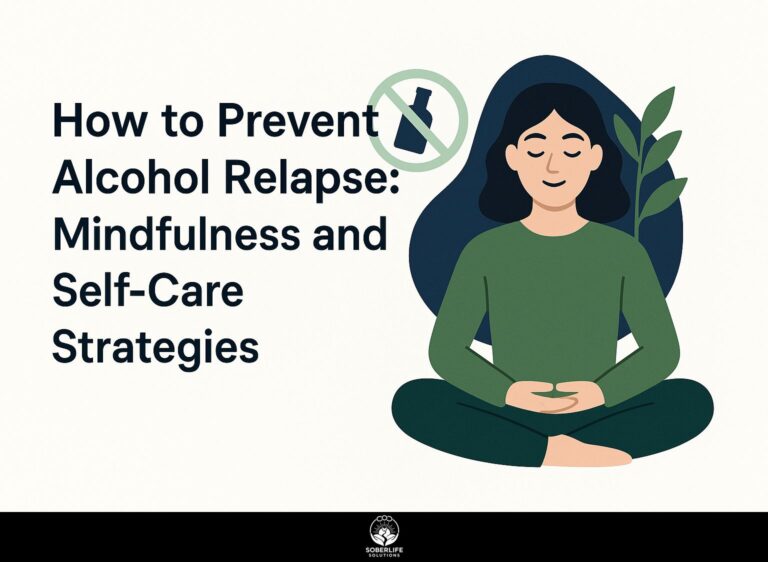Five Rules of Recovery: Strategies and Importance
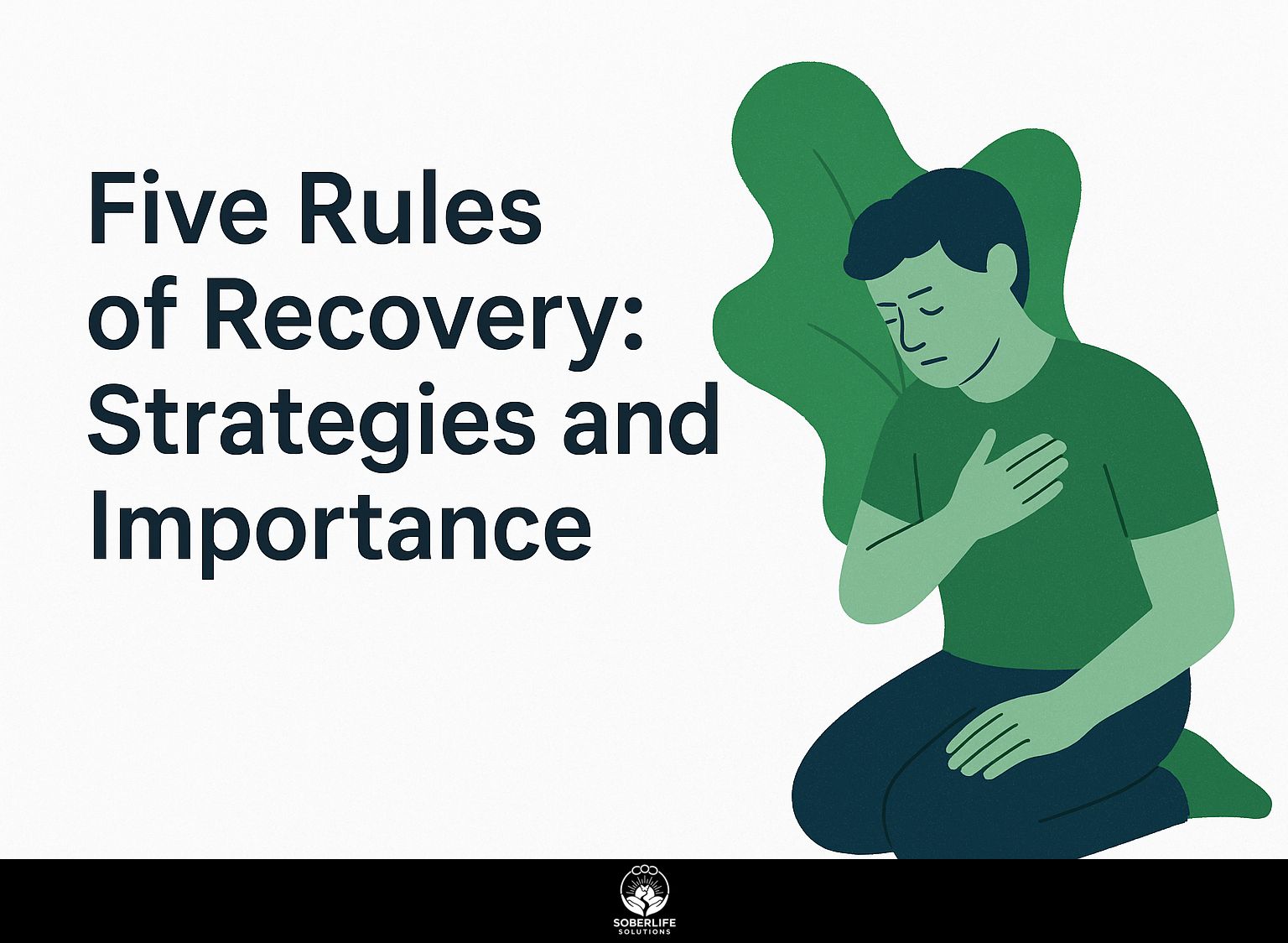
Overcoming addiction involves a series of highs and lows, with the chance of falling back into old habits always present. Grasping the details of emotional and mental relapse is important for anyone going through this experience. Through the principles established by groups like Alcoholics Anonymous, we can find effective strategies to support our recovery. In this article, we’ll go over five important rules of recovery that can help you grow stronger and keep changes for the long term.
Key Takeaways:
Understanding Recovery
Recovery is a lifelong process that encompasses emotional, psychological, and physical healing, aiming for a healthier lifestyle post-addiction.
- The first step in getting better is usually detox, where people remove drugs or alcohol from their bodies with the help of doctors.
- After detox, it’s important to continue with therapy. Methods like Cognitive Behavioral Therapy (CBT) can help deal with root problems and raise awareness, as explored by JAMA Network in their comprehensive studies. For further insights into these techniques, consider our deep dive into CBT’s role in recovery.
- Tools such as SMART Recovery offer structured self-help techniques that promote self-reliance and personal empowerment.
- Joining community support groups can help you stay responsible and connect with others who have been through similar situations, increasing the chances of lasting success.
Importance of Recovery in Life
Improving recovery supports mental health and strengthens individuals to handle upcoming difficulties, allowing them to succeed in their new life.
This strength appears in various ways. For instance, individuals who engage in regular therapy or join support groups report a significant reduction in relapse rates, which hover around 40-60% in the first year without support. A recent publication from ScienceDirect provides detailed insights into the determinants and prevalence of relapse among patients, underscoring the importance of sustained support.
Using mindfulness techniques can improve emotional balance, helping people control cravings more effectively. Tools like meditation apps or journaling can be beneficial. As mentioned, keeping a recovery journal provides a structured approach to reflection, aiding in emotional regulation and personal growth.
Creating a reliable support system and applying useful coping strategies are key to long-term recovery and mental well-being.
The Five Rules of Recovery
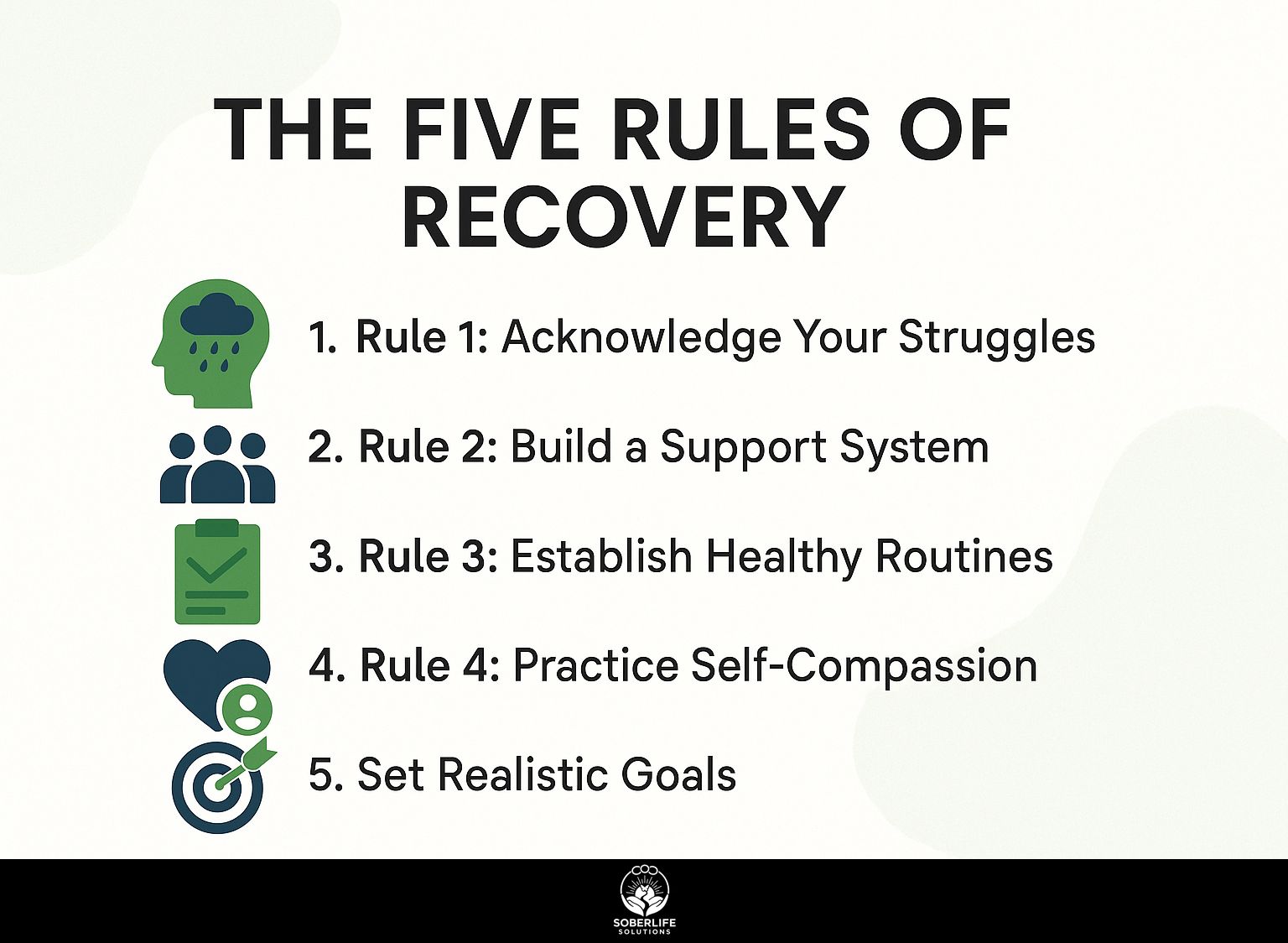
Following five key rules can greatly help a person recover, encouraging self-awareness and responsibility. This approach includes understanding how to effectively communicate feelings, a crucial aspect of recovery as detailed in our guide on how to communicate feelings for recovery.
Rule 1: Acknowledge Your Struggles
Acknowledging struggles is the first step in recovery, allowing for honest self-assessment and the identification of high-risk situations.
To handle these challenging situations, try keeping a daily journal to write down your emotions and what sets them off.
Writing in a journal before going to sleep can help you think about how you felt during the day and notice recurring themes.
Apps like Moodfit or Daylio let you keep track of your feelings anytime, helping you notice common patterns in what causes them.
Make time each week to go over your notes. This can help you learn more and find ways to manage challenges.
Rule 2: Build a Support System
Joining support groups like Alcoholics Anonymous or Narcotics Anonymous can provide important motivation and accountability.
To find local support groups, start by visiting Meetup.com, where you can search for addiction recovery groups in your area. Consider joining community centers or churches that often host support meetings.
Online, platforms like Reddit have active communities, such as the r/stopdrinking subreddit, providing virtual support. Look for Facebook groups dedicated to sobriety where members share their experiences and strategies. In fact, virtual recovery groups are becoming increasingly popular, offering flexibility and accessibility to those seeking support.
Being part of these groups helps people talk about problems and share successes with each other. The Mayo Clinic highlights that support groups can be crucial in forming meaningful connections and getting help.
Rule 3: Establish Healthy Routines
Creating and maintaining healthy routines can reinforce positive behaviors and reduce the risk of relapse during recovery.
To establish effective daily routines, integrate exercise, mindfulness practices, and balanced nutrition.
Start your day with 30 minutes of cardio using an app like Fitbit to track your progress. Spend at least 10 minutes meditating with [Headspace](https://www.headspace.com) or [Insight Timer](https://www.insighttimer.com).
For balanced nutrition, use MyFitnessPal to log meals, ensuring you hit key macronutrient targets. This organized method encourages physical health and aids mental wellness, forming a solid base for ongoing recovery.
Rule 4: Practice Self-Compassion
Practicing self-compassion helps individuals deal with setbacks and promotes a healthier emotional state during the recovery process.
To improve self-kindness, try adding particular methods to your daily habits.
Start by identifying negative self-talk patterns; tools like the `Thought Diary’ can help you document and challenge these thoughts.
Next, practice mindfulness meditation using apps such as Headspace or Calm, which provide guided sessions focused on self-acceptance.
Engage in positive affirmations; for instance, repeat phrases like, ‘I am enough’ or ‘My struggles do not define me.’
Using these techniques often can change how you talk to yourself inside, helping you become tougher and feel better emotionally.
Rule 5: Set Realistic Goals
Setting realistic and achievable goals is essential for maintaining motivation and steering the recovery path effectively.
Start setting goals by clearly describing what you want to achieve using the SMART method. For instance, instead of saying, “I want to get fit,” opt for, “I will exercise for 30 minutes, four times a week for the next three months.” This goal is specific, measurable, and time-bound.
Next, make sure your goals fit your personal growth. If you want to focus on mental health, try including activities like daily meditation for 10 minutes.
Review your progress weekly, adjusting as necessary to stay aligned with your aims.
Strategies for Implementing the Rules
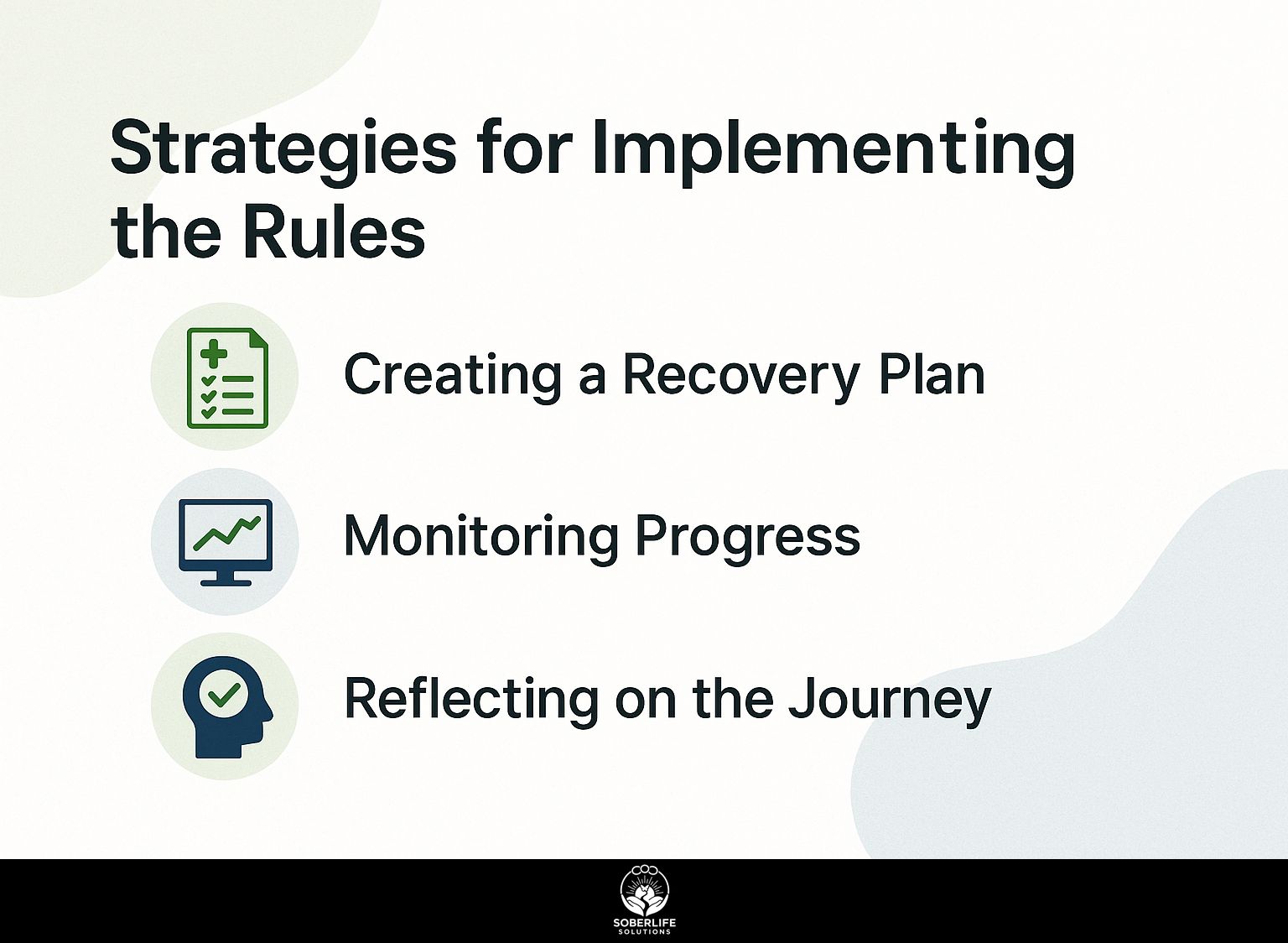
Applying the five recovery rules needs practical methods aimed at supporting long-term change and self-improvement. Integrating SMART goals into your recovery plan can be particularly effective for setting clear, actionable objectives. See also: SMART Goals Framework in Recovery, which offers a structured approach to achieving sustainable progress.
Creating a Recovery Plan
A clear recovery plan helps you stay focused and motivated during the healing process.
Begin by identifying personal triggers that may lead to setbacks. This could include stress, particular environments, or even certain individuals.
Next, establish both short-term and long-term goals; for instance, short-term goals might involve daily mindfulness practices, while long-term goals could focus on maintaining relationships or returning to work.
Add self-care activities, like journaling or exercising, to your daily routine.
Tools like Trello can help organize these tasks by setting deadlines and tracking progress, ensuring you remain accountable and engaged throughout your recovery.
Monitoring Progress
Checking progress often is important for spotting successes and changing recovery plans when necessary.
One effective method is to have weekly reflections by asking yourself questions like:
- What progress have I made?
- What obstacles did I encounter?
You can improve this process by using apps like Daylio, which let you record your daily activities and feelings, showing visual patterns over time. Consider maintaining a journal, where you can jot down thoughts and feelings.
These self-review techniques help you understand your progress and improve your plans for better results.
Reflecting on the Journey
Contemplating personal growth and milestones achieved can serve as a powerful motivator to stay committed to recovery.
To improve your reflection process, try writing in a journal frequently. Each day, write down three things you’re grateful for or affirmations that reinforce your progress.
Practice mindfulness through meditation; apps like Headspace or Calm can guide you in beginning a daily routine.
Another effective strategy is to create a vision board: gather images and quotes that depict your goals and aspirations. Display this in a prominent location to inspire you and keep your goals top of mind, helping you to visualize the positive path forward.
Frequently Asked Questions
What are the Five Rules of Recovery?
The Five Rules of Recovery are methods and advice for people trying to beat addiction and keep living a healthy, alcohol-free life. These rules include honesty, willingness, open-mindedness, self-care, and service.
Why are the Five Rules of Recovery important?
The Five Rules of Recovery are important because they offer a solid base for people to rely on as they work towards recovery. These rules promote accountability, self-reflection, and support in maintaining a healthy and sober lifestyle.
How does the rule of honesty play a role in recovery?
The rule of honesty encourages individuals to be truthful with themselves and others about their addiction and the impact it has had on their life. When people are honest, they can start to identify and tackle the main reasons for their addiction, helping them move towards positive change.
What does open-mindedness mean during recovery?
In recovery, open-mindedness means accepting new thoughts, viewpoints, and answers. This is important for overcoming addiction because it allows individuals to experiment with various recovery methods and find the ones that work best for them.
How does self-care play a role in recovery?
Taking care of yourself is an important part of getting better because it helps people focus on their physical, mental, and emotional health. This can include healthy habits such as exercise, proper nutrition, and practicing relaxation techniques to support overall recovery.
What is the role of service in recovery?
The final rule of service promotes the idea that individuals in recovery can benefit from giving back to their community and helping others who are also struggling with addiction. By helping others, individuals can find purpose and satisfaction in their recovery process.

